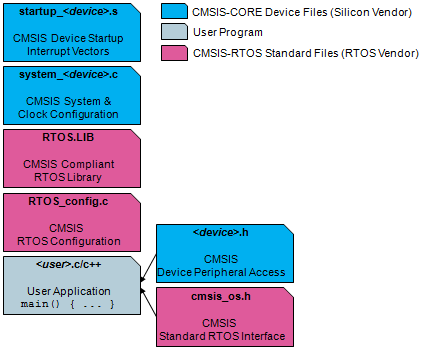 |
CMSIS-RTOS
Version 1.03
Real-Time Operating System: API and RTX Reference Implementation.
|
 |
CMSIS-RTOS
Version 1.03
Real-Time Operating System: API and RTX Reference Implementation.
|
A CMSIS-RTOS implementation is typically provided as a library. To add the RTOS functionality to an existing CMSIS-based application, the RTOS library (and typically a configuration file) needs to be added. The available functionality of the RTOS library is defined in the header file cmsis_os.h that is specific for each CMSIS-RTOS implementation.

Depending on the CMSIS-RTOS implementation, execution may start with the main function as the first thread. This has the benefit that an application programmer may use other middleware libraries that create threads internally, but the remaining part of the user application just uses the main thread. Therefore, the usage of the RTOS can be invisible to the application programmer, but libraries can use CMSIS-RTOS features.
Once the files are added to a project, the user can start working with the CMSIS-RTOS functions. A code example is provided below:
Code Example
The file cmsis_os.h is a template header file for a CMSIS-RTOS compliant Real-Time Operating System (RTOS). Each RTOS that is compliant with CMSIS-RTOS shall provide a specific cmsis_os.h header file that represents its implementation.
The file cmsis_os.h contains:
Name conventions and header file modifications
All definitions are prefixed with os to give an unique name space for CMSIS-RTOS functions. Definitions that are prefixed os_ are not used in the application code but local to this header file. All definitions and functions that belong to a module are grouped and have a common prefix, i.e. osThread.
Definitions that are marked with CAN BE CHANGED can be adapted towards the needs of the actual CMSIS-RTOS implementation. These definitions can be specific to the underlying RTOS kernel.
Definitions that are marked with MUST REMAIN UNCHANGED cannot be altered. Otherwise the CMSIS-RTOS implementation is no longer compliant to the standard. Note that some functions are optional and need not to be provided by every CMSIS-RTOS implementation.
Define and reference object definitions
With #define osObjectsExternal objects are defined as external symbols. This allows to create a consistent header file that is used throughout a project as shown below:
Header File
This header file defines all objects when included in a C/C++ source file. When #define osObjectsExternal is present before the header file, the objects are defined as external symbols. A single consistent header file can therefore be used throughout the whole project.
Example
Header file cmsis_os.h